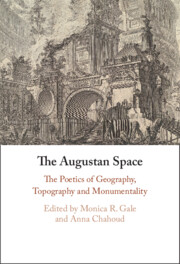Book contents
- The Augustan Space
- The Augustan Space
- Copyright page
- Contents
- Notes on Contributors
- Preface
- Abbreviations
- Introduction
- Chapter 1 The City in Horace’s sermo
- Chapter 2 excucurristi a Neapoli
- Chapter 3 Poetic and Imperial Spaces in Propertius, Books 1–3
- Chapter 4 Horace on Sacred Space
- Chapter 5 Roman Topography, Politics and Gender
- Chapter 6 aurea nunc, olim siluestribus horrida dumis
- Chapter 7 Hippolytus and Egeria in the Woods of Aricia (Virgil, Aen. 7.761–82 and Ovid, Met. 15.479–551)
- Chapter 8 locum tua tempora poscunt
- Chapter 9 imperii Roma deumque locus
- Chapter 10 The Rise and Fall of Virgil’s Sublime Carthage
- Chapter 11 Eccentric Poetry
- Chapter 12 Virgilian Heterotopias
- Chapter 13 loci desperati
- Works Cited
- Index Locorum
- General Index
Chapter 7 - Hippolytus and Egeria in the Woods of Aricia (Virgil, Aen. 7.761–82 and Ovid, Met. 15.479–551)
Where Greek Myth and Italic Myth Come Together
Published online by Cambridge University Press: aN Invalid Date NaN
- The Augustan Space
- The Augustan Space
- Copyright page
- Contents
- Notes on Contributors
- Preface
- Abbreviations
- Introduction
- Chapter 1 The City in Horace’s sermo
- Chapter 2 excucurristi a Neapoli
- Chapter 3 Poetic and Imperial Spaces in Propertius, Books 1–3
- Chapter 4 Horace on Sacred Space
- Chapter 5 Roman Topography, Politics and Gender
- Chapter 6 aurea nunc, olim siluestribus horrida dumis
- Chapter 7 Hippolytus and Egeria in the Woods of Aricia (Virgil, Aen. 7.761–82 and Ovid, Met. 15.479–551)
- Chapter 8 locum tua tempora poscunt
- Chapter 9 imperii Roma deumque locus
- Chapter 10 The Rise and Fall of Virgil’s Sublime Carthage
- Chapter 11 Eccentric Poetry
- Chapter 12 Virgilian Heterotopias
- Chapter 13 loci desperati
- Works Cited
- Index Locorum
- General Index
Summary
This chapter focuses on the episode of Hippolytus and Egeria in Ov. Met. 15.479–551, and particularly on the relation between the content of the two stories told (Hippolytus’ death and rebirth; Egeria’s metamorphosis) and the space in which they are told. The inner story, recounted by Hippolytus himself, involves the characters (Hippolytus, Theseus, Phaedra) in a well-known plot, with a tragic outcome and a Greek setting. The frame of the story is the Latian wood of Aricia, in which the rites in honour of Diana/Lucina, goddess of birth and fertility, take place: here we have no story of violence and death, but of rebirth (Hippolytus/ Virbius), devotion and fidelity (Numa and Egeria). The place rewrites the destinies of the characters involved: the space of Rome is the one in which Ovid celebrates not (only) the political power of Augustus, whose mother comes from Aricia, but more and most prominently the cultural power that Augustan poetry has to give life to a new mythology of regeneration and transformation of old forms (Hippolytus) into new ones (Virbius).
- Type
- Chapter
- Information
- The Augustan SpaceThe Poetics of Geography, Topography and Monumentality, pp. 114 - 125Publisher: Cambridge University PressPrint publication year: 2024



